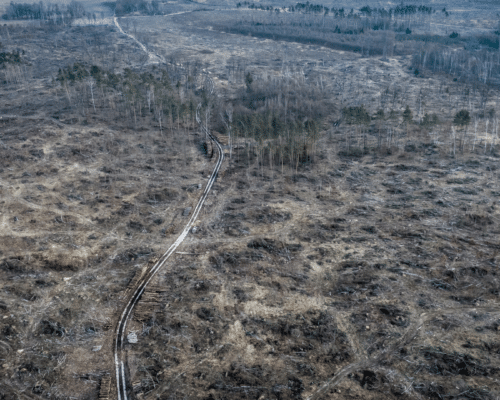2024 India General Elections – Opportunity to Advance Sustainable and Resilient Agri-food Transition [Op-Ed]
01 May 2024 – by Dr Roopam Shukla
India’s successful transition from a food deficit to a food surplus nation is globally acknowledged and has brought several opportunities for farming communities. However, the opportunities have been observed to be skewed and threatened by the ongoing climate change and the unsustainable nature of certain farming practices. Scientific literature highlights that changing climate patterns, marked by unpredictable rainfall and temperature shifts, have significantly reduced crop yields and affected farmers’ livelihoods across India. The adverse effects of climate change on agriculture are particularly pronounced in the major crop baskets of India, where staple crops like rice and wheat have experienced significant declines in yield over the past few years. These staple crops are susceptible to changes in temperature and rainfall patterns, making them vulnerable to the increasing unpredictability of the weather. For instance, prolonged heatwaves and unseasonal rainfall have reduced crop yields and affected the produce’s quality. The decline in agricultural productivity also threatens nutrition security by limiting access to essential food grains, which are primary sources of nutrients for millions of Indians. The growing evidence of climate risk in agriculture demands an alternative approach to a sustainable and just agri-food system.
The 2024 general elections present a pivotal moment for local leaders and policymakers to elevate the discourse on how sustainable and resilient farming practices are essential for the future of India’s agriculture sector. Within the Indian political debate, climate change’s impacts on agriculture have moved from peripheral discussions to the centre stage of India’s national political discourse. The breadth and depth of questions posed in the Lok Sabha during the 2022-23 sessions present the wide spectrum of concerns that intersect agriculture and environmental sustainability. Notably, a direct reference to the “Effects of climate change on crops” on December 15, 2022, underscores the explicit connection between climate change and agricultural productivity.
In the past, the government of India has adopted a multi-faceted approach linking technology, innovation and policy reforms to secure the agriculture sector against climate vagaries, thereby ensuring the sector’s sustainability and resilience in the long run. Recognising the critical interplay between climate change and food security, the Government of India (GoI) initiated the National Mission for Sustainable Agriculture (NMSA) under the National Action Plan on Climate Change, designed to foster sustainable farming practices and develop effective adaptation strategies to ensure food security and livelihood opportunities in the face of climatic variability. Further amplifying its commitment, the government launched the National Livestock Mission (NLM) and the National Fisheries Development Board (NFDB), targeting the augmentation of livestock and fisheries production in environmentally sustainable ways. The National Initiative on Climate Resilient Agriculture (NICRA), a flagship programme by the Indian Council of Agricultural Research (ICAR), is dedicated to researching and demonstrating climate-resilient agricultural practices across diverse farming systems. Other programmes like the National Mission on Agriculture Extension & Technologies (NAME&T), Integrated Watershed Management Programme (IWMP), Mahatma Gandhi National Rural Employment Guarantee Scheme (MGNREGS), the Pradhan Mantri Krishi Sinchayee Yojana (PMKSY), a centrally sponsored scheme on micro irrigation and the Pradhan Mantri Fasal Bima Yojana (PMFBY) for crop insurance against weather risks, have been implemented among others to ensure the long term sustainability and resilience of the agriculture sector.
Along with these production-oriented policies, the GOI is also enabling the transition of Indian agriculture towards sustainable and less resource-intensive practices by promoting agroecological and natural farming with chemical-free inputs (Zero Budget Natural Farming) while focusing on the broader LIFE (Lifestyle for Environment) approach.
These policies support a holistic pathway toward sustainable agriculture that mitigates the adverse impacts of agriculture practices on water, soil and the environment. However, effective implementation on the ground and limited awareness among farmers are critical areas that require further emphasis. Despite robust policy frameworks, delivering benefits to the intended recipients often encounters bureaucratic and logistical hurdles. As identified in several stances, streamlining delivery mechanisms to ensure that schemes are more accessible and that benefits reach all the farmers could be pivotal. Though schemes like NMSA and NICRA are in place, additional incentives for adopting climate-resilient practices can encourage more farmers to transition. Enhanced credit support and higher support prices for farmers adopting practices that reduce dependency on chemical inputs and improve water use efficiency can support this transition.
The ongoing elections provide an opportunity to identify and reflect on these issues and commit to deeper, more impactful reforms to safeguard the environment and address climate change impacts. The decisions made at the ballot box could determine the future trajectory of Indian agriculture, its contribution to the economy, and the well-being of the ‘food-growers’ of our country.
Dr Roopam Shukla is the Assistant Professor at the Centre of Excellence in Disaster Mitigation and Management at the Indian Institute of Technology, Roorkee.
Disclaimer: The views and opinions expressed in this article are those of the author and do not necessarily reflect the official policy or position of Energy Tracker Asia.









